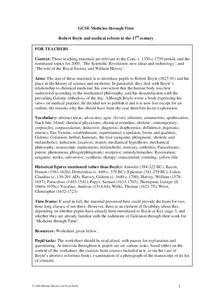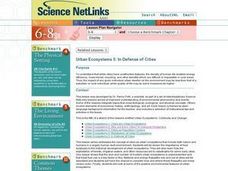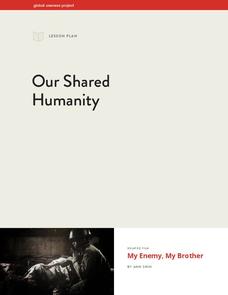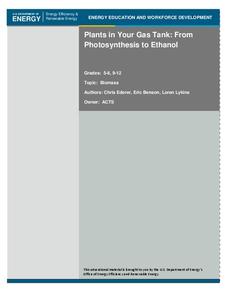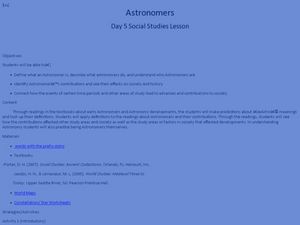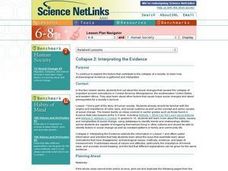Curated OER
If I Could Be An Inventor, I Would Invent...
Students create an invention. In this scientific technology lesson plan, students discuss inventors and how their inventions helped others. Students brainstorm ideas for inventions and their rationale behind it. In small teams, students...
Michael Hunter and Fiona Kisby
Robert Boyle and Medical Reform in the 17th Century
Introduce pupils to the work of Robert Boyle and his influence on medical practice through a series of informational texts and discussion questions.
Deliberating in a Democracy
Cloning
Learners explore the issues and challenges of cloning. In this cloning lesson plan, students read about how cloning affects people and the types of cloning, then they prepare a debate either for or against cloning.
Curated OER
Urban Ecosystems 5: In Defense Of Cities
Students explain that while cities have unattractive features, the density of human life enables energy efficiency, mass transit, recycling, and other benefits which are difficult or impossible in rural areas. This is the fifth in an...
Curated OER
Crowley's Ridge: An Upland in the Lowlands
Young geographers examine how Crowley's Ridge was formed. This is one Arkansa's six natural geologic divisions. The history of Crowley's Ridge is important in that the first settlers of the state were attracted to this region, and it...
Curated OER
Ben Franklin Timeline
Celebrate inventions such as lightning rods, bifocals, and stoves with a Ben Franklin Day. Young historians conduct research and write a paragraph about an accomplishment of Benjamin Franklin including an illustration or collage that...
Global Oneness Project
Our Shared Humanity
Ann Shin's award-winning documentary, My Enemy, My Brother introduces viewers to Zahed Haftlang and Najah Aboud, two child soldiers on opposite sides during the Iran-Iraq war. After viewing the film, class members are asked to reflect on...
Curated OER
Earth, The Universe, And Culture
High schoolers examine how science is interpreted based on social environments. They watch and discuss a video, identify scientists and locate their countries of origin on a map, explore various websites, and complete a handout.
Curated OER
A Photosynthesis Timeline
Science learners discover that scientific advancements come in increments. Beginning as an idea, changes and developments are influenced by available resources and current societal values. As an example, pupils examine the conclusions...
Curated OER
Entrepreneurship: Creating Products and Systems That Meet the Needs of Your Clients
There is no better way to learn about a subject than with a hands on project. Middle schoolers design and create a product that meets the needs of fictitious clients. They view a PowerPoint, consider how the Western marketing style is...
Polar Bears International
Taking Action!
Motivate young scientists to stand up and take action with this environmental science lesson. To begin, the class works in small groups brainstorming actions that support the conservation of the earth before creating and implementing an...
NOAA
A Watery World
With about 70% of the earth's surface covered in oceans, it's fair to say that we live in a very wet world. Young scientists gain a better appreciation of this fact as they use maps to identify the world's ocean basins in the first...
Earth Day Network
Filtering Water
See the water filtration system up close with a fun science experiment. Young scientists work for several class periods to design a water filter using household objects, and then decide which filter material would be most effective in...
Safe Drinking Water Foundation
To Filter or Not to Filter
Drinking clean water can be taken for granted. Explore the process and high cost of filtering water with a water pollution and filtration activity. Young scientist build a filtration system to filter polluted water, examine the economics...
Curated OER
Can Young Children Distinguish Between Living and Non-living Things?
What does it mean to be living? Help your young scientists identify living and non-living things as a result of their learning through discovery. Observation of and interaction with a set of natural phenomena in their community will make...
Curated OER
Plants in Your Gas Tank: From Photosynthesis to Ethanol
Explore ethanol and how it is produced. Young scientists investigate photosynthesis and fermentation to the concept of conservation of energy and mass. They discuss the environmental and economical benefits of ethanol as a fuel additive.
Green Education Foundation
How Loud is Too Loud?
Ever wonder how loud a sound has to be to cause damage? Young scientists explore sound properties by researching decibel levels. They discuss how sound is perceived by our ears and our brains and why it can cause negative health effects...
Curated OER
Changing Planet: Melting Glaciers
Resource links to a video, satellite images, data, and photographs of glaciers provide emerging earth scientists the opportunity to examine how the ice has been retreating over the years. A data table is included for pupils to record...
Maryland Department of Natural Resources
Eyes on Dissolved Oxygen
Learn about the factors that affect the way oxygen dissolves in salt water with a chemistry lab. After studying the molecular structure of water, young scientists figure out how aeration, temperature, and organic waste affect dissolved...
Polar Trec
Animal Monitoring Introduction
Not only do mealworms taste great, they are also great for classroom science lessons. In pairs, young scientists observe and record what they see as they check out what their mealworms are doing from minute to minute. Each minute...
NOAA
Into the Deep
Take young scientists into the depths of the world's ocean with the second lesson of this three-part earth science series. After first drawing pictures representing how they imagine the bottom of the ocean to appear, students investigate...
Curated OER
Astronomers
Students explore the profession of astronomy. In this social studies instructional activity, students read articles on astronomers contributions to society and history. Students reference the Bible for recorded astronomies impact on...
Curated OER
Making Good Decisions
Learners practice balancing different interests involved in social problems. In this informative lesson students are given social problems and come up with realistic solutions based on the advantages and disadvantages of each.
Curated OER
Science NetLinks: Collapse 2: Interpreting the Evidence
Students continue to explore the factors that contribute to the collapse of a society; they also explore how archaeological evidence is gathered and interpreted. Students explore about the social changes that caused the collapse of...



